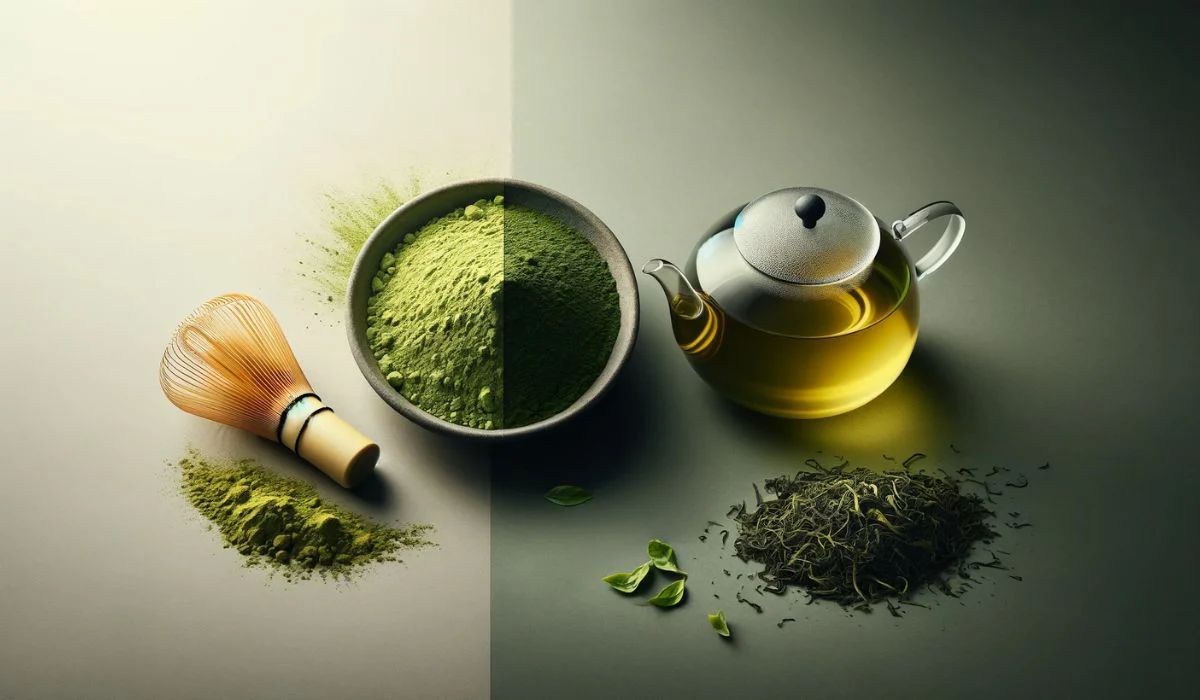
Matcha vs. Green Tea: Why Matcha is the Superfood You Need
- Author
- No Comments
In the world of health and wellness, matcha has become a beacon of nutritional excellence, outshining traditional green tea in numerous ways. Both matcha and green tea hail from the Camellia sinensis plant, but the differences in their processing and consumption lead to distinct variations in health benefits and versatility. This detailed exploration will compare matcha with green tea, highlighting why matcha is often considered the superior choice for those seeking to optimise their health and wellness.
A Nutritional Powerhouse

Antioxidant Density
When it comes to antioxidants, matcha is unparalleled. This vibrant green powder boasts an exceptional concentration of catechins, particularly epigallocatechin gallate (EGCG). EGCG is a potent antioxidant known for its potential in combating oxidative stress and reducing the risk of chronic diseases. Studies indicate that matcha contains up to 137 times more EGCG than standard green tea, making it a formidable ally in the fight against free radicals and inflammation.
Green tea, while still rich in antioxidants, does not match the antioxidant density of matcha. This is because green tea is brewed from leaves that have been steeped, meaning that many of the antioxidants remain in the leaves rather than being fully extracted into the liquid. Consequently, matcha’s whole-leaf consumption offers a more concentrated source of these beneficial compounds.
Nutritional Profile
In addition to its superior antioxidant content, matcha offers a more robust nutritional profile. A single serving of matcha provides a rich array of vitamins and minerals, including vitamin A, vitamin C, calcium, iron, and potassium. The presence of L-theanine, an amino acid found in matcha, contributes to its unique ability to promote relaxation and enhance focus, creating a calm yet alert state of mind.
Green tea also provides valuable nutrients, but the levels are diluted compared to matcha due to the lower concentration of tea leaves consumed. While green tea is a good source of certain vitamins and minerals, it does not offer the same comprehensive nutritional benefits as matcha.
Health Benefits: Matcha vs. Green Tea

Metabolism and Weight Management
Matcha’s impact on metabolism and weight management is notable. The high concentration of EGCG in matcha has been linked to increased fat oxidation and improved metabolic rate. Studies suggest that drinking matcha can boost calorie burning and aid in weight loss more effectively than green tea. This enhanced metabolic effect is partly due to the synergy between EGCG and caffeine in matcha, which together contribute to a more pronounced thermogenic effect.
Green tea also supports metabolism and weight management, but its effects are less pronounced compared to matcha. While green tea can aid in weight loss and improve metabolic function, matcha’s higher catechin and caffeine content provides a more potent boost to these processes.
Energy and Mental Clarity
Matcha is renowned for its ability to provide sustained energy and mental clarity. Unlike coffee, which can lead to jitteriness and energy crashes, matcha’s unique combination of caffeine and L-theanine results in a smooth and steady energy boost. L-theanine promotes relaxation and mental focus, counteracting the potential overstimulation from caffeine and ensuring a more balanced energy experience.
Green tea also contains caffeine and L-theanine, but the effects are generally milder. The caffeine content in green tea is lower than in matcha, which can result in less pronounced energy and cognitive benefits. While green tea does provide a gentle pick-me-up, it does not offer the same level of sustained energy and mental clarity as matcha.
Heart Health
Both matcha and green tea contribute to heart health, but matcha’s superior antioxidant levels offer enhanced cardiovascular benefits. The EGCG in matcha has been shown to improve cholesterol levels, reduce blood pressure, and support overall heart health. The comprehensive nutrient profile of matcha, including potassium and magnesium, further supports cardiovascular function.
Green tea also benefits heart health, thanks to its own antioxidant and anti-inflammatory properties. It can help reduce LDL cholesterol and improve blood vessel function. However, matcha’s more concentrated antioxidant content provides a more substantial impact on heart health.
Culinary Versatility
Creative Uses
Matcha’s versatility extends far beyond the traditional cup of tea. It’s vibrant colour and unique flavour makes it an excellent ingredient for a variety of culinary creations. From matcha lattes and smoothies to baked goods and savoury dishes, matcha can be seamlessly incorporated into numerous recipes. The powder form of matcha allows for easy mixing and blending, making it a popular choice for chefs and home cooks alike.
Green tea, while versatile, is typically used in its brewed form and does not lend itself as easily to culinary experimentation. While it can be used in some recipes and beverages, green tea’s flavour and form are less adaptable compared to matcha.
Convenience
For those looking to incorporate matcha into their daily routine, the convenience of powdered matcha cannot be overstated. It can be quickly whisked into hot water or mixed into smoothies, providing an efficient way to enjoy its health benefits. Additionally, matcha’s longer shelf life compared to loose green tea leaves makes it a practical choice for busy lifestyles.
Green tea requires brewing, which can be time-consuming and less convenient for those with hectic schedules. The preparation process involves steeping the tea leaves and waiting for the right temperature and time, which may not fit seamlessly into a fast-paced lifestyle.
Availability and Accessibility
- Finding Matcha Tea: For those interested in exploring the benefits of matcha, finding quality matcha tea near you is essential. Many speciality stores and online retailers offer a range of matcha products, from ceremonial grade to culinary grade. When searching for matcha tea near me, consider checking local health food stores, Asian markets, and dedicated tea shops to find the best options for your needs.
- Online Resources: In addition to local sources, online retailers provide access to a wide variety of matcha products. Websites that specialise in tea or health foods often carry high-quality matcha, and many offer detailed product descriptions to help you choose the right matcha for your purposes. When purchasing matcha online, look for reputable sellers that offer transparent information about the sourcing and quality of their products.
Conclusion
While both matcha and green tea offer significant health benefits, matcha stands out as a superior superfood due to its higher antioxidant content, more comprehensive nutritional profile, and versatile culinary applications. Its ability to provide sustained energy, support weight management, and promote heart health makes it a valuable addition to any wellness routine.
For those looking to elevate their health and culinary experiences, exploring matcha tea near me or you is a worthwhile endeavor. Whether you’re seeking a powerful antioxidant boost, a sustained energy source, or a versatile ingredient for creative recipes, matcha proves to be the superfood you need. Embrace the vibrant green powder and unlock its myriad benefits for a healthier, more vibrant you.

